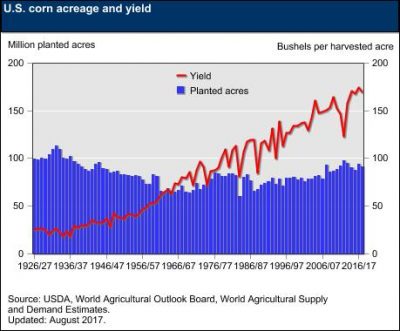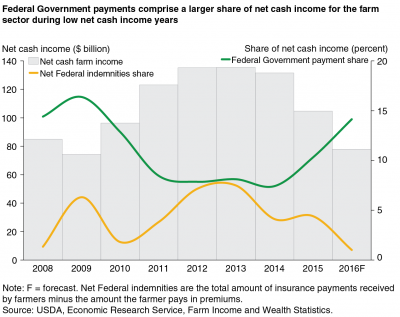Farm Progress' Joshua Baethge reported at the end of last week that "it’s hard to find anyone optimistic about passing a new farm bill this year. While the two political…
Lawmakers Offer Perspective on the Farm Bill
Today’s update continues the focus on news items highlighting the attention Representatives and Senators placed on Farm Bill issues during the August recess. As lawmakers get set to return to Washington, D.C. next week, today’s update provides an overview of some of this summer’s Farm Bill constituent engagements, and also looks briefly at news articles describing the current state of the agricultural economy.
Farm Bill Summer- Background
Late last month, House Ag Committee members held a Farm Bill listening session in Texas, followed by similar meetings with farmers and ranchers in early August in both Minnesota and California.
In addition to the legislative branch activity, Secretary of Agriculture Sonny Perdue visited several Midwestern states this month in his “Back to Our Roots” tour, where he also visited with agricultural stakeholders and gathered information on Farm Bill policies.
#ICYMI Sonny Perdue Begins Back to Our Roots Tour in 5 Midwestern States- https://t.co/3NQ4SuiiYu
— Dept. of Agriculture (@USDA) August 20, 2017
Also during the August recess, individual lawmakers heard a variety of Farm Bill concerns from constituents as work on formulating policies for the reauthorization of the omnibus measure continued, see examples here and here.
Farm Economy
Financial Times writers Gregory Meyer and Andres Schipani reported last week that, “Grand Island, Nebraska received two types of tourists on Monday. The first gazed heavenwards as a total solar eclipse passed by. The second saw humbler sights: farm fields.
“This small city directly in the eclipse’s path was also a stop on the annual Farm Journal Midwest Crop Tour, a caravan of farmers, hedge fund managers, brokers and analysts roaming the heart of the world’s leading corn and soyabean growing region. This week they are measuring corn ears and bean pods with a goal of estimating the US harvest.
If Chicago’s futures markets are an indication, the crops will be big for a fifth consecutive year.
“In the past month corn for December delivery has fallen 8.5 per cent to $3.60 a bushel, December wheat has tumbled 18 per cent to $4.29 a bushel and November soyabeans have fallen 8.3 per cent to $9.37½ a bushel.”

The FT article noted that, “The US corn and soyabean growing season has been unpredictable, leading to price gyrations. Wet weather delayed some planting, but July heat dried out pockets of the western corn belt. A drought damaged the spring-planted hard red wheat crop: three-quarters of South Dakota’s fields are rated poor or very poor by the US Department of Agriculture.
“‘I would characterise this year as having just staved off a crop disaster,’ says Scott Irwin, an agricultural economist at the University of Illinois and principal at YieldCast, a crop yield forecasting company. ‘It has been quite a variable growing season from the beginning.’
This might lead to more uncertainty than unusual about the size of the US harvest, potentially jolting prices in coming months.
Also, Jesse Newman and Benjamin Parkin reported on Friday at The Wall Street Journal Online that, “Crop scouts who fanned out across the Farm Belt this week reported another big corn and soybean harvest in the making, deepening concern over falling prices and incomes in the troubled farm economy.”

The Journal writers added that, “Crop scouts warned early frost could still damage late-maturing crops, denting yields. But if corn and soybeans come in close to forecasts, the harvest would add to ample global surpluses.
“That’s bad news for farmers squeezed by high seed and land costs and rising farm output in countries like Brazil and Russia. The U.S. Department of Agriculture expects farmers to make half as much money this year as they did in 2013.”
More Recent Farm Bill Perspective from Lawmakers
A news release on Thursday from the Senate Ag Committee indicated that, “U.S. Senator Pat Roberts, R-Kan., Chairman of the Senate Committee on Agriculture, Nutrition, and Forestry, today addressed nearly 400 Kansans at the Kansas Governor’s Summit on Agricultural Growth.”
.@SenPatRoberts tells Kansans: Challenges Are Great, But #FarmBill18 Offers Certainty, Opportunities https://t.co/RzbbsAOuBD #growkansas pic.twitter.com/RxQEG6wcC3
— Sen. Ag Republicans (@SenateAgGOP) August 24, 2017
In his remarks, Sen. Roberts noted that, “Low commodity prices are weighing on farm sector profits for both row-crop and livestock producers. Crop receipts are expected to decline by over $42 billion and livestock receipts by over $23 billion.
“On the credit front, reduced farm income over the past four years has continued to weaken credit conditions in the agricultural sector. Tight profit margins and ongoing cash flow shortages are increasing the demand for loans and creating decline in repayment rates.
“Producers are expending more working capital to meet short-term obligations. Many farmers are becoming more leveraged as working capital is decreasing while debt levels continue to rise.”
Chairman Roberts added that:
First, we need to ensure that producers have risk management tools at their disposal – let me emphasize that crop insurance is, for many, the most valuable tool in the risk management toolbox.
And an update on Friday at KSNT- TV (Topeka, Kans.) Online reported that, “‘This is no time to be proposing revolutionary ideas with the farm bill,’ [Sen. Roberts] said. ‘It’s a time to see what’s working, what isn’t. Keep what’s working. Try to improve where we can do better.’
“Roberts said he doesn’t want to make cuts to crop insurance programs, but rather reduce regulations that impact farmers and ranchers.”
Tim Carpenter reported on Friday at The Topeka Capital-Journal Online that, “‘Yes, we will have to meet our budget figures,’ [Chairman Roberts] said. ‘But, we can do so in a way where we achieve efficiencies, I think, as opposed to major cuts. Everybody thinks these programs are for urban areas. They’re not. They’re for the entire country. We find the same kind of conditions in rural and small-town America.’
Roberts said a bipartisan coalition of urban and rural lawmakers in Congress would be necessary to approve a new farm bill incorporating food nutrition and agriculture production policy.
Meanwhile, Liz Morales reported on Wednesday at The Columbus Telegram (Neb.) Online that, “Agriculture was a main topic of discussion Wednesday during U.S. Sen. Deb Fischer’s listening session in Albion.
“Fischer said she expects a big fight when the 2018 farm bill is debated in Congress.
‘The Heritage Foundation out of Washington has targeted the farm bill as the No. 1 program to defeat,’ Fischer said. ‘That doesn’t bode well for Nebraska. The No. 1 priority is keeping that crop insurance.’
The article stated that, “Fischer said there is a movement by some activists to tie more conservation programs into any kind of farm payments. These programs can in turn be tied into crop insurance.
“‘I think the programs have been really beneficial to farmers,’ Fischer said. ‘But putting an extra burden on our farmers isn’t the way to go.'”
. @SenJohnHoeven talks Ag issues and Farm bill at his recent Ag Roundtable near Casselton VIDEO: https://t.co/swtyrcIKTS
— Chris Berg (@chrisbergPOVNOW) August 25, 2017
And James Q. Lynch reported last week at the Quad-City Times (Davenport, Iowa) Online that, “With Congress set to take up discussion of a new farm bill, Sen. Joni Ernst is ‘heavily focused’ on gathering ideas from Iowans involved in agriculture from the field to the market on ‘where we can do better and what we’re doing well.’
“In a meeting Wednesday evening, she heard a few major complaints along with plenty of suggestions for improvements ranging from crop insurance to the Conservation Reserve Program, from changes in the North American Free Trade Agreement to the need to improve locks and dams on the Mississippi River.”
The article added that, “Preserving crop insurance is the No. 1 issue she hears when discussing the farm bill, Ernst said.”
Great discussion at Nichols Farms in Adair County on everything ranging from trade and the 2018 Farm Bill to national defense. #99CountyTour pic.twitter.com/9Vgatr4FUS
— Joni Ernst (@SenJoniErnst) August 24, 2017
Ad Crable reported on Thursday at Lancaster (Pa.) Online that, “Wearing blue jeans and thankful to shed a tie, U.S. Sen. Bob Casey arrived at a large Washington Boro dairy farm Wednesday to field Pennsylvania farmers’ biggest concerns before the federal government tackles a new nationwide Farm Bill.
“He departed the Nelson Breneman farm with no lack of suggestions on what needs to be packed into the every-6-years-or-so blueprint for farm security.
“Casey heard consistently that dairy farming, in particular, is struggling.”
The article stated that, “In opening remarks before sitting back and listening to a roundtable of local farmers and statewide farm groups, Casey readily admitted the new Margin Protection Program created in the 2014 Farm Bill with the intention of helping dairy farmers was an outright failure…’The Margin Protection Program didn’t get the job done. It’s as simple as that,’ Casey said as Holstein cows strolled by the room’s window.”
Mr. Crable also pointed out that, “The lack of reliable cell service and high-speed internet service in rural areas was broached by several participants as a hindrance to Pennsylvania farming being all it can be.
A repeated theme also was the importance of crop insurance to keeping all types of farmers afloat, especially young and beginning farmers.
Veronica Coons reported on Saturday at the Great Bend Tribune (Kans.) Online that, “Early Saturday morning, Congressman Roger Marshall conducted the tenth and final stop on his 2018 Farm Bill Listening Tour in the community of Haven. The tour started Friday, Aug. 18, and has been attended by more than 400 constituents overall.”
Ms. Coons noted that, “After each person was given an opportunity to speak, Marshall shared what he’d gleaned from all ten stops.
“‘Number one, it’s tough times, and this is the third tough year in agriculture in a row,’ he said.”
The article added that, “Number two, the biggest concern on the farm bill is crop insurance.
“‘What I’ve heard over and over again is how important crop insurance is, and it’s the number one concern we keep together on the farm bill,’ he said.”
Grateful Ranking Member @SanfordBishop took up my offer to visit the #CentralCoast for an Ag tour-Read about it here https://t.co/wCW4YXHy6p pic.twitter.com/CnMxxBvVNg
— Rep. Jimmy Panetta (@RepJimmyPanetta) August 25, 2017
And a news release on Friday from Rep. Jimmy Panetta (D., Calif.) stated that, “This week, [Rep. Panetta] welcomed Congressman Sanford Bishop (GA-02), ranking member of the House Appropriations Subcommittee on Agriculture, to the central coast of California to tour agriculture facilities, meet with producers and farmworkers, and learn more about the over 100 specialty crops grown in California’s 20th congressional district.
“‘As the representative of the Salad Bowl of the World, I believe it is critical to share with my colleagues the important work of our growers, shippers, and farmworkers. I thank Ranking Member Bishop for coming to the Central Coast to gain a deeper understanding of the uniqueness, diversity, and expansiveness of our agriculture industry,’ said Congressman Panetta. ‘I look forward to working together to advocate for the resources and funding for programs that our producers, community organizations, and research entities need to thrive.'”
The release added that, “The three-day tour, which took place from August 23rd to 25th, included visits to berry, lettuce, and other specialty crop producers; a large-scale organic operation; a beginning farmer training association; and the USDA Agricultural Research Service lab in Salinas.”





